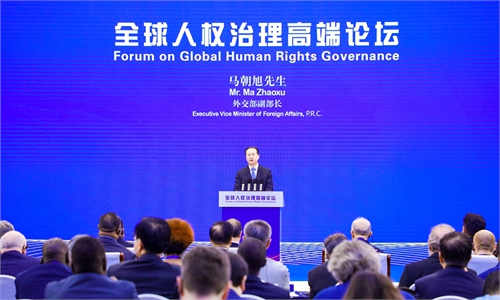Shaping the diversity of human rights civilizations through cooperation for development

Illustration: Liu Rui/Global Times
Human rights are an essential concept of modern human civilization, the key to safeguarding the subjectivity of human values and searching for the sources of legitimacy of the human political community. Through post-World War II reflections and the critique of the value of human subjectivity and political modernity, based on the UN Charter and the Universal Declaration of Human Rights, mankind has reached a consensus on human rights as a category of modern civilization, and has formed a "human rights civilization" based on respect for and protection of human rights as an integrated form.
However, within the global governance structure of human rights, there is a debate between monistic and pluralistic forms of civilizational human rights.
In the vision of some Western human rights scholars and politicians, there is only one true form of human rights civilization, which bears the fruit of universal human civilization, namely, Western human rights civilization.
There are two core connotations of this monism of human rights civilization based on Western centrism.
First, it equates the history of the development of human rights civilization, which is the fruit of common human civilization, with the history of the evolution and dissemination of Western civilization, and it denies the diversity of the development of human rights civilization. Continuing the narrative of the Western origins of the modern concept of human rights, Western centrism has been quietly inserted into the history of the development of human rights civilization, shaping a monistic human rights civilization rooted in Western centrism.
Second, the monism of Western human rights civilization proclaims the so-called end of history thesis by American political scientist Francis Fukuyama, arguing that Western political civilization with liberal democracy at its core may become the ultimate mode of human ideological evolution and the final form of human political rule, thus denying the infinite nature of the development of human rights civilization.
Under this "Fatal Conceit," Western countries seek a global ideological monopoly with human rights as the core issue, attempting to use the monism of human rights civilization based on Western centrism to influence the path of nation-building and the trajectory of human rights development in a vast number of developing countries, curbing the development of human rights in countries they regard as "strategic competitors," and trying to manipulate global human rights governance for their national interests by controlling the discourse of human rights civilization.
However, it is the denial of the diversity and infinity of the development of human rights civilization that has made the Western monism of human rights civilization an alienated form of human rights theory.
In the 21st century, the evolution of human civilization clearly demonstrates that civilization is pluralistic and the paths of civilization development are diverse. According to those who believe in civilizational pluralism, with American professor Samuel Huntington as the very representative, a multi-civilizational world system is emerging. The civilization of the West is not universal. The manner with which the modern China develops shows that civilizations are innovating and diversifying.
There are two core propositions of civilizational pluralism of human rights. First, the civilizational form of human rights is diverse. While affirming that human rights play an indispensable role in the global governance of the 21st century, it strongly emphasizes that human rights are the fruits and symbols of the progress of human civilization.
Second, various human rights civilizations are equal. In a certain sense, the people-centered Chinese concept of human rights and the path of human rights development with Chinese characteristics have created a new form of human rights civilization and objectively enriched the variety of human rights civilization. The Chinese form of human rights civilization will serve as a new model of human rights philosophy and human rights development for the majority of developing countries. At the same time, China insists on the leading position of the UN in global human rights governance and opposes unilateralism and hegemony.
Together with the international community, China promotes global human rights governance in a more equitable, just, reasonable and inclusive direction, enriches the content of human rights civilizations, and makes contributions to the development of human civilization.
The author is distinguished professor at Guangdong University of Technology. opinion@globaltimes.com.cn



